| |
|
|

|
|
ATLAS |
|
|
Assistive
Technology
Laboratory
at
Stanford |
|
|
|
Technology
and design benefitting individuals with disabilities and older adults in the
local community |
February 8, 2017 |
|
|
|
|

Perspectives is the newsletter of the
Stanford course,
Perspectives in Assistive
Technology.
This issue once again
invites you to the next class session,
solicits project suggestions for
Mobility and Older Adults,
and announces a Book Talk and a Film
Festival.
|
Perspectives in Assistive Technology is a Winter
Quarter Stanford course - now starting its eleventh year - that explores
the design, development, and use of assistive technology that benefits people
with disabilities and older adults. It consists of semi-weekly classroom
discussions; lectures by notable professionals, clinicians, and
assistive technology users; tours of local medical, clinical, and
engineering facilities; student project presentations and demonstrations; an
assistive technology faire; and a film screening. |
Next class
session - Tuesday, February 14th at 4:30pm:
|
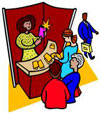
|
Assistive Technology
Faire
|
Abstract: The Assistive Technology Faire will
provide an opportunity for students and community members to get an up-close
look at a variety of devices and learn about available programs from product
vendors and service agencies. Users of assistive technology products as well as
small companies and agencies serving individuals with disabilities and older
adults will bring assistive technology devices to display, demonstrate, and
discuss.
The Faire starts at 4:30pm on Thursday,
February 14th just outside the classroom,
Thornton 110.
Here are photos
from last year's event.
Vendors:
|

|
Whill
Wheelchair
Whill, Inc. - Chris Koyama
The Whill is an
omnidirectional four-wheel-drive mobility device meant to give wheelchair users
a sleek alternative to standard chairs, which many believe reinforce
stereotypes of weakness or helplessness. The product recently received the
Good Design Grand
Award. |
|

|
Eyefluence’s
Eye-interaction Platform
Eyefluence - Peter Milford
Eyefluence’s
eye-interaction platform provides technology that can be integrated
into any head mounted device to realize the potential for wearable computing by
connecting your brain to the internet through your eyes. Head-mounted displays
equipped with Eyefluence's eye-interaction technology have the potential to
expand human intelligence, enhance social interaction, and revolutionize
entertainment. |
|
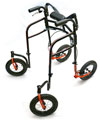
|
Life
Glider™
Life Glider™ - Rob
Karlovich
The Life Glider™ is an innovative
walking aide with a unique hands-free support feature for people with balance
and weight-bearing challenges. It enables users to stand and walk safely and
comfortably for extended periods while engaged in everyday activities such
cooking and grocery shopping. |
|
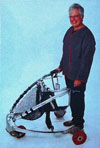
|
Podna Rover
Podna Designs - Elaine Levin
The Podna Rover
is an innovative all-terrain mobility device for individuals who need
additional support to maintain balance or stability while walking. The device
offers confidence to outdoor travelers over gravel, uneven surfaces, and
inclines. It features compliant wheels, a self-centering frame, a suspension to
soak up bumps, and self-locking brakes. |
|
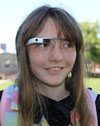
|
Autism Glass
The Autism Glass Project at Stanford
Medicine - Jena Daniels & Jessey Schwartz
The project uses
Google Glass to help people with Autism Spectrum Disorder understand social
cues and aid the behavioral therapy treatment process. Using a custom eye
tracking infrared camera and Glass's head motion tracking sensors and
microphone, the software analyzes the wearer's behavior when interacting with
others, displays real time social cues about facial expressions (i.e.
"interested," "frustrated," etc), and records the amount and type of eye
contact made. |
|

|
Service Dog
Training
Service Dog Tutor - Jean Cary and
Service Dog Flicka
Service Dog
Tutor adapts clients' own dogs to do specific service tasks for their
owners. Clients include seniors and children who have mobility and balance
challenges as well as cognitive disabilities. |
|

|
Assistive Technology Lending
Library
Silicon Valley
Independent Living Center - Joe Escalante
Silicon Valley
Independent Living Center (SVILC) is a cross-disability, intergenerational,
and multicultural disability justice organization that creates fully inclusive
communities that value the dignity, equality, freedom, and worth of every human
being. SVILC maintains a lending library of assistive technology so consumers
may borrow a device free of charge to try it before buying it, to compare
similar devices, or to use while a personal device is being
repaired. |
|

|
Dance4Healing
Dance4Healing - Amy Li
Dance4Healing
is a tele-exercise live video platform leading telehealth into physical
rehabilitation, bringing community support, exercise, and fun to home care.
Inspired by founder Amy Li's stage IV cancer journey, our mission is to
alleviate mental and physical pain and reduce medical costs. Rooted in
neuroscience and published medical studies, our social platform connects dance
teachers, clinicians, chronic patients, care-partners, elders, and healthy
users. We use artificial intelligence and behavior design to provide and
recommend personalized music, dance, buddies, and groups; use feedback from
patient monitoring to record progress; and suggest follow-on
therapies. |
|

|
Soccer Guard
Soccer Guard - Karen
Brown
Power
soccer is the fastest growing sport for users of power wheelchairs. The United
States Power Soccer Association (USPSA) was founded in 2006. San Jose power
soccer teams (4-person teams) practice and play at Bascom Community Center in
San Jose. A standard piece of equipment is the guard that attaches to the
wheelchair to "kick" the ball and protect the user. As there wasn't any
off-the-shelf equipment available that fit Jacob Field's wheelchair, this
soccer guard was designed and fabricated by Jim Fuller of Sunnyvale.
|
|

|
SmartWalk Mobility
Aid
SmartWalk - Raghav Ganesh & Durga
Ganesh
SmartWalk is a low-cost, adaptable, user-tested,
add-on mobility aid for the traditional white cane used by the visually
impaired. SmartWalk virtually extends the cane’s reach threefold,
empowering users with safer mobility, greater independence, and
autonomy. |
|
Attend a lecture -
Guest lectures will be held on Tuesdays and
Thursdays from 4:30 to 5:50pm and are open to
the greater Stanford community. You are most welcome to sit in on any class
sessions that interest you. You need not be a Stanford student and there is no
required signup, enrollment, or charge. The class will meet in a large, tiered,
accessible classroom on campus in the Thornton Center, adjacent to the Terman
Fountain and near the Roble Gym, the same venue as last year. Here are the
parking options, maps, and directions to
the classroom. |
 |
|
|
Did you miss a lecture? - Course
lectures are posted on YouTube. To find the links, browse to the
Lecture Schedule webpage, scroll down and click
on the lecture of interest. Near the bottom of the page you will see the
Lecture Material section which has links to the slides, photos, weblinks, and
lecture video. |
 |
|
|
Solicitation for Mobility Projects for Older
Adults
A
capstone course is the academically integrative experience of an
undergraduate educational program that gives students an opportunity to
demonstrate the knowledge and skills they have gained during their time in
college. This experience helps prepare them for their engineering
careers.
ME113
- Mechanical Engineering Design - is a capstone course for seniors in
Mechanical Engineering at Stanford. In this course, students pursue on
"real-world" engineering problems offered by a company or other organization
(project partner).
Starting from a description of project goals provided by the project
partner, a student team of four seniors will develop a design concept and
explore its practical feasibility by fabricating and testing a series of
increasingly refined working models. Each project will supervised by a faculty
member using information and advice supplied by the project partner.
The
course will be conducted in the 10-week Spring Quarter from April through
mid-June.
One of
the themes this academic year is Mobility for Older Adults with a focus
on automobiles and driving.
At
this time, the course is soliciting problems or challenges that could be
addressed by a team of students.
The
best suggestions will be those that represent real problems experienced by an
individual with a disability or older adult in the local community that affects
their ability to drive or otherwise access transportation. Other suggestions
that broadly affect one's ability to walk or move are also welcome.
Please
email me your suggestions describing the problem and important features of what
a solution should do, but not how to achieve them. Thank you for your
consideration. |



 |
|
Upcoming Local
Events
|
Ashton Applewhite - Book Talk: A Future without
Ageism
People
are happiest at the beginnings and the ends of their lives. The vast majority
of Americans over 65 live independently. The older people get, the less afraid
they are of dying. Why then are so many of us scared stiff at the prospect of
growing old? Underlying all the hand-wringing is ageism, the last socially
sanctioned prejudice. A movement against it is emerging with Ashton Applewhite
as its leader and her book, This
Chair Rocks: A Manifesto Against Ageism, as a catalyst.
The Institute for the Future is pleased to
invite you to join us as we listen to Ashton dispel myth after myth about late
life and propose an alternative: wake up, cheer up, and push back. She's as
funny as she is fierce, and she just might change the way you think about the
rest of your life. Join us as we explore the opportunities and challenges ahead
for a future without ageism. What would change - between our ears and in
society at large - if ageism were as unacceptable as any other form of
prejudice? What actions could be taken today to redefine late life over the
next decade?
Ashton
will be appearing at The Institute for the Future at 210 Hamilton Ave in
downtown Palo Alto on Tuesday morning (10:00 - 11:30am), February 14th
for the
book
talk. This is a free event, but space is limited.
If
you're interested in attending, you can register
here.
|
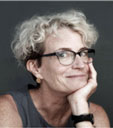
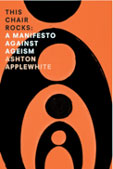 |
|
|
8th Annual Adaptive Arts Film Festival
This
event features local and international films by, for, and about individuals of
all abilities and is sponsored by the
College of Adaptive Arts Film
Festival as a part of its 9th Annual Celebration - Differing
Abilities.
The
Festival is scheduled for Sunday, April 23rd from 2 to 5pm at the
Bluelight Cinemas 5 Cupertino
Oaks, 21275 Stevens Creek Blvd. in Cupertino with a Meet-and-Greet
following the event at the nearby Hobee's Restaurant. |

|
|
Support the course - Funding in
any amount for the course and student projects is always welcomed. Monetary
gifts support approved project expenses, administrative costs, honoraria for
guest lecturers, and the end-of-term celebration. Refer to the
Team Project Support webpage for more
information.
Email questions, comments, or
suggestions - If you have general questions, comments, or
suggestions about the course, email
David L. Jaffe, MS, the instructor. Thank you again for your interest in
the course.
Dave
|

To unsubscribe from this newsletter, please email
Dave. |
|






















